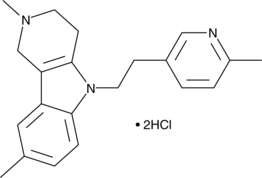Territorial Availability: Available through Bertin Technologies only in France
- Synonyms
- 2,3,4,5-tetrahydro-2,8-dimethyl-5-[2-(6-methyl-3-pyridinyl)ethyl]-1H-pyrido[4,3-b]indole, dihydrochloride
- Correlated keywords
- neurodegeneration Alzheimer’s diseases Huntington’s neuroprotection cognition inhibitors inhibits inhibition calcium channles ?-amyloid ? amyloid NMDA glutamate receptors mitochondria dimeboline dimebon neurochemistry neuroscience Indoles
- Product Overview:
Dimebolin is a neuroprotective agent.{17760,15457,17770} It binds to histamine H1 and H2 receptors (IC50s = 3.8 and 287 nM, respectively), as well as ?1A-, ?1B-, ?1D-, and ?2A-adrenergic receptors (ARs), imidazoline I2 receptors, and the serotonin (5-HT) receptor subtypes 5-HT2A, 5-HT2C, 5-HT6, and 5-HT7 (Kis = 8-313 nM).{49510} It also inhibits NMDA-evoked currents and voltage-gated calcium channels in mouse primary striatal neurons (IC50s = 10 and 50 ?M, respectively).{17760} Dimebolin (50 ?M) inhibits glutamate-induced apoptosis in primary striatal neurons derived from the YAC128 transgenic mouse model of Huntington’s disease. It inhibits cell death induced by amyloid-? (25-35) (Item No. 24155) in cerebellar granule cells when used at a concentration of 25 ?M.{15457} Dimebolin (1 mg/kg) inhibits decreases in two-way active avoidance reaction (TWAA) acquisition in a rat model of Alzheimer’s disease induced by 1-ethyl-1-(2-hydroxyethyl) aziridinium (AF64A).{17770}
Cayman Chemical’s mission is to help make research possible by supplying scientists worldwide with the basic research tools necessary for advancing human and animal health. Our utmost commitment to healthcare researchers is to offer the highest quality products with an affordable pricing policy.
Our scientists are experts in the synthesis, purification, and characterization of biochemicals ranging from small drug-like heterocycles to complex biolipids, fatty acids, and many others. We are also highly skilled in all aspects of assay and antibody development, protein expression, crystallization, and structure determination.
Over the past thirty years, Cayman developed a deep knowledge base in lipid biochemistry, including research involving the arachidonic acid cascade, inositol phosphates, and cannabinoids. This knowledge enabled the production of reagents of exceptional quality for cancer, oxidative injury, epigenetics, neuroscience, inflammation, metabolism, and many additional lines of research.
Our organic and analytical chemists specialize in the rapid development of manufacturing processes and analytical methods to carry out clinical and commercial GMP-API production. Pre-clinical drug discovery efforts are currently underway in the areas of bone restoration and repair, muscular dystrophy, oncology, and inflammation. A separate group of Ph.D.-level scientists are dedicated to offering Hit-to-Lead Discovery and Profiling Services for epigenetic targets. Our knowledgeable chemists can be contracted to perform complete sample analysis for analytes measured by the majority of our assays. We also offer a wide range of analytical services using LC-MS/MS, HPLC, GC, and many other techniques.
Accreditations
ISO/IEC 17025:2005
ISO Guide 34:2009
Cayman is a leader in the field of emerging drugs of abuse, providing high-purity Schedule I-V Controlled Substances to federally-licensed laboratories and qualified academic research institutions for forensic analyses. We are certified by ACLASS Accreditation Services with dual accreditation to ISO/IEC 17025:2005 and ISO Guide 34:2009.





